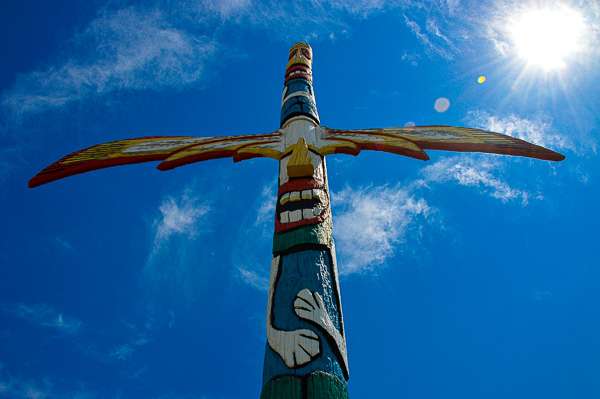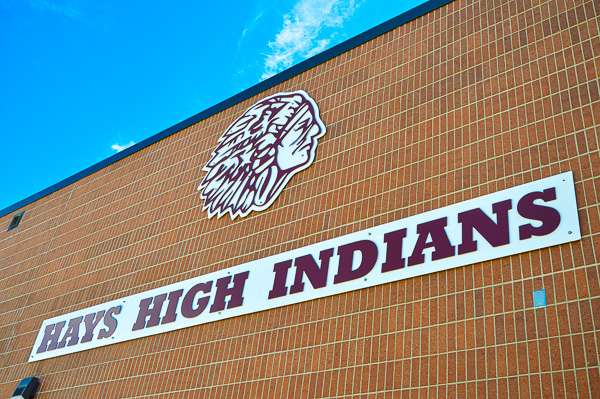
By JAMES BELL
Hays Post
As racial injustices recently became a large part of the national dialogue, a local issue has generated heated debate online, sparked by a pair of competing petitions about the use of the Indian as the mascot at Hays High.
Arguments for and against changing the mascot has drawn intense feelings as thousands of people have weighed in on social media and on the website change.org, where the petitions are hosted.
The first petition was started by Hays High alumna Delphine Burns about two weeks ago asking for the mascot to be changed.
“The intolerance and harm promoted by these 'Indian' sports mascots, logos, or symbols, have very real consequences for Native people,” the petition said. “The Hays High School mascot is a blatant display of racism.”
“The Indian of Hays High has been the mascot of Hays High for many years,” Becker’s petition said. “The mascot is trying to be removed permanently because it 'displays racism,' even though it’s just a mascot of a school. There is no display of racism as we are not judging or causing distress against the Native Indian people of America. This has been our symbol for too long, and we shall not let them take it away.”
On both sides, comments by petitioners have solicited strong feelings.
“I'm signing because while the intentions may be good to say, 'we don't disrespect Indians,' the reality proves otherwise,” said one comment in support of the change. “The existence of this mascot opens the door to racist stereotypes by other schools as well as HHS students. We need to make the right and justifiable decision to change the Hays High mascot.”
Another said “It is offensive to Native Americans. Our ancestors stole their land and enslaved them. The least we can do is respect their culture since our ancestors didn't.”
On the other side, comments have also poured in.
“Somebody has way too much time on their hands and wants some attention!” a commenter said. “If the word 'Indian' is offensive to you, then you might have other underlying issues that you probably should get checked out.”
“I’m signing due to heritage, not hate, and removing something that someone is complaining about because they have nothing better to do and to see something as offensive and more worried about something hurting their feelings is pathetic,” said another petitioner. “There is no racism behind a simple mascot. These are the people that are corrupting the world today.”
While the comments and signatures continued to pour in both for and against, the creators of both petitions were surprised by the amount of attention the petitions garnered, but more importantly, they both hope that serious conversations can come out of the use of the Indian mascot.
“I believe in the right to petition. I think it’s awesome to see a young person be passionate about something and take a step toward doing something about it,” Burns said about the petition to keep the mascot.
Becker also appreciates the opinions on the other side.
“I completely respect the other people,” Becker said. “I’m glad they did something that they felt was right and I’m glad about that.”

But Burns said the comments that leaned toward the mascot being a part of history that should not be forgotten, are missing the point.
“There are still Native Americans today, but if we look at why there are so few Native Americans, it’s a direct result of white imperialism and genocide,” Burns said.
She also believes as a woman that has experienced discrimination anytime someone in the majority can stand up for a person in the minority it helps alleviate the burden minority populations face.
“I can’t imagine being one of a handful of Native Americans students and deciding that this mascot is hurtful to you, but not wanting to bring it up because as a minority you are already marginalized and you are already trying to fit in with this predominately white student body,” Burns said.
“I see my role as a white ally in racial justice movements sometimes to raise those more uncomfortable questions,” she said. “In the same way, I would hope men would advocate for women’s rights … I hope that I can be that ally to persons of color.”
Further, she said the name "Indian" itself can be offensive to Native Americans.
“It’s dehumanizing to have a mascot be an entire ethnicity of people and then also to not even be called Native American, but to be called Indians and then on top of that, it’s a predominately a white school. So it feels like stealing of a culture and commodifying, even if some Native Americans are OK with it, it doesn’t mean that all Native Americans are.”
As a part of her research, she looked at Native American groups that have advocated for Native American mascots to be changed and with a long list of Native American groups arguing for the change for decades, she feels like it is time for Hays to look at their use of the mascot.
The history of Native Americans is one of genocide by whites that should color the conversation about the mascot being used as a part of a historical reference, she said.
“Native Americans still exist today. It’s not just history. These communities are very much alive,” Burns said.
“For those that are alive to have to live with that injustice of genocide, historically and also be a race when we say that is history, it’s like no ‘This is who I am today,’” she said.

Much of what is happening in Native American communities is ignored and those that say the mascot is honoring them should look at what is currently happening, Burns said.
“If you are really going to say I care about these people and (the mascot) honors them, honor them by learning more about what is going on and what is impacting them today,” she said.
The idea of changing the mascot is something that has been on her mind for a long time, but with more people talking about racial injustice this was a good time to bring the idea of the change back to the surface.
“It’s a good time to reflect back on past injustices,” she said. “In some ways I think people are opening up a little more now to understand that there is injustice.”
She also saw other alumni talking about it, so she felt she could mobilize those people into a conversation.
But she wasn’t sure anyone would sign it and was surprised by the response.
“I didn’t even think my petition would get 100 signatures. I wasn’t expecting it to be shared very much,” Burns said. “It’s like this is a traditional thing. I thought maybe people would be annoyed. I didn’t realize there would be all this passion on the other side.”
While she is a strong supporter of the change, she said the decision should be made by those in the community.
“It’s not really my place to decide what they do. But I think it could be a really cool opportunity to engage students and see if students have ideas for other things that accurately reflect history,” Burns said.
Becker was also surprised by the response to the petitions and hopes that a conversation can start with Native American groups but would like to see the mascot stay the same.
“It’s phenomenal how everyone is feeling about this. How basically whole communities are getting together on this and how both sides are competing, yet we are still human, and we still respect each other and we need to learn to respect each other even if our values are different,” Becker said.
“I support both sides,” he said. “I support mine a little more, but they have good points too. I have a pretty open mind about this, and I am going to respect everybody for what they believe in.”

While he respects the opinion of the other side, Becker has multiple reasons for why the mascot should remain.
“(Hays High students) all support our mascot,” Becker said. “There is no racism behind it. If there is racism behind it, we would be offending their culture. We want to be celebrating it.
“It shows the symbol of home, bravery strength and courage,” he said.
He believes the use of the mascot might even spur interest in the local Native American cultures that lived in the area.
“If we took the time to learn about their culture, we would appreciate it even more,” Becker said.
He said most people he knows in the school agree with keeping the mascot but is understanding of those that would like to see it changed.
“If they think differently and they don’t want it, I am still going to respect them. It’s OK to think differently,” Becker said.
And he said has never seen a disparaging action come from the use of the Native American mascot during his time at the school.
“If anything, we cherish our mascot. We don’t degrade it,” Becker said.
But even with a strong belief the mascot should not be changed, he said, he and others would like to have a respectful conversation about the mascot with Native American communities to judge their opinion.
“We want to have a respectful chat with them and get their opinion on it,” Becker said. “If they don’t like the mascot, maybe we could change it or look into an alternative.
“We would like to take a very respectful approach to it in a very mannered way,” he said. “We would love to spend the day with them and get to know them and their culture and ask them politely if our mascot is OK.”
But until then, he maintains the current mascot should remain.
“I would like to try to keep the mascot and do it in style and with maturity,” Becker said.

He said many comments suggest to him that at least some Native Americans support keeping the mascot.
Using the mascot can also help keep the history and importance of the Native American history in the public mind, as there are few Native Americans remaining in the area.
“This town is rich in Native American history,” Becker said, noting large collections of Native American artifacts found in the area, and current archeological research in northwest Kansas.
“It’s not about offending the culture. It’s about the history that we have here and that they had here,” Becker said.
With his petition, he wanted to make sure that both opinions were represented.
“We are doing great, and they are doing great,” Becker said. “Everything we do, someone is going to be mad. So what can we do that someone isn’t going to be mad about?”






